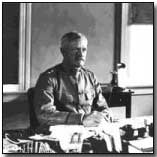Who's Who - John Pershing
 John Joseph
Pershing (1860-1948) was born on 13 September 1860 in Laclede, Missouri.
John Joseph
Pershing (1860-1948) was born on 13 September 1860 in Laclede, Missouri.
After a period spent as a schoolteacher at Prairie Mound, nine miles from Laclede, Pershing (known as 'Black Jack Pershing') entered a competitive examination for an appointment to West Point in spring 1882; his primary aim being to secure further education. Pershing won the exam and went to West Point.
Although not an especially outstanding student (graduating 30th out of a class of 77) he was noted early on by officers for his leadership qualities. He was elected president of the class of 1886, and each year held the highest rank in the Cadet Battalion. Pershing commanded the Corps of Cadets when it crossed the Hudson from West Point to Garrison to stand and present arms while the funeral train of Ulysses S. Grant passed by.
Pershing took up duty as Professor of Military Science and Tactics at the University of Nebraska in September 1891, a post he held for four years.
During his varied military career Pershing performed frontier duty against the Sioux and Apache from 1886-90, where he won the Silver Star Medal; fought in the Cuban War in 1898; in the Philippines in 1903, cleaning up the Moro insurrectionists; and with the Japanese army during the Russo-Japanese war of 1904-5, as an observer. He was promoted to Brigadier General in 1906. This was followed by the Mexican Punitive Expedition (of 10,000 men) to capture Pancho Villa in Mexico in 1915.
Following the U.S. declaration of war against Germany in 1917, Pershing - now a General - was appointed Commander-in-Chief of the American Expeditionary Force (AEF). At the time of his appointment there was no expeditionary force available as such; the regular army comprised 25,000 men at most, and no effective reserves. Pershing needed to recruit an organised army and get it into the field; 500,000 men. Eventually the National Army grew - over the period of a year and a half - to nearly 3 million men.
Pershing personally led the successful Meuse-Argonne offensive of 1918.
In 1921 Pershing became U.S. Army Chief of Staff. He retired from active duty in 1924 at the age of 64, having been awarded the title 'General of the Armies' by Congress, a post previously held only by George Washington (and only then retrospectively awarded in 1976).
His autobiography, My Experience of War, was published in 1931, winning the Pulitzer Prize for history in 1932.
John Joseph Pershing died on 15 July 1948 in Washington, D.C.
Click here to listen to a speech given by Pershing during wartime. Click here to read Pershing's official report of the U.S. expedition into Mexico to crush Pancho Villa's supporters. Click here to read Pershing's official despatch dated 1 September 1919. Click here to read Pershing's official reaction to news of Ferdinand Foch's appointment as supreme commander. Click here to read Pershing's address to Foch on the matter on 28 March 1918. Click here to read Pershing's account of the urgent European call for extra U.S. troops in May/June 1918. Click here to read Pershing's reaction to fighting at Cantigny in May 1918. Click here to read Pershing's account of fighting at the Battle of Belleau Wood in June 1918. Click here and here and here to read Pershing's account of the Second Battle of the Marne. Click here to read Pershing's official summary of the Meuse-Argonne Offensive.
Feature: The Life of General John J. Pershing
"Wipers" was the British nickname for the Belgian town Ypres.
- Did you know?
